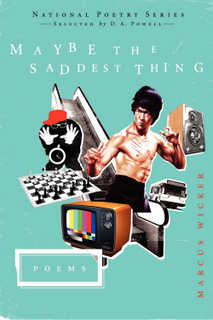In Their Own Words
Marcus Wicker's “Self Dialogue Watching Richard Pryor Live on the Sunset Strip”

Self Dialogue Watching Richard Pryor Live on the Sunset Strip
What of stepping outside the door on fire?
What of running down a faceless road
Let alone a busy strip, enflamed? Got-damn!
There must be 10,000 selves in an epidermis. Imagine
Yours. Imagine the skin-peeling flame of each self-
Inflicted arson. Imagine the freedom to say God
Damn! To consider what that feels like. To speak
A wild geyser spraying from a busted hydrant.
You watch Richard Pryor in a loud fire engine
Red suit— all flashing lights, sirens: 10,000 selves
Visible to the world, & consider what that feels like.
To think, you may or may not be God damned.
To know, at least, your dick is intact.
All rights reserved. Reprinted with the permission of the author.
On "Self Dialogue Watching Richard Pryor Live on the Sunset Strip"
Comedians do more than make us laugh; they woo crowds into the world of a joke. With facial tics and anaphora and alligator shoes, they often sit us down in neighborhoods we distrust or are not privy to. They make us feel safe, activate the car alarm then crowbar the window for the knock off satchel sunning in the passenger seat. We, the audience, are always in awe and thankful for this skill. This ability to build a playful rapport amongst strangers as if magic. To allow us to laugh at ourselves. My favorite comedians, like Richard Pryor, love to laugh at themselves. They make such universal beauty of self-examination, which is surely in a poet's job description.
The summer of 1980 Richard Pryor lit himself on fire after freebasing cocaine. In a drug-induced psychosis he doused himself in high proof rum then proceeded to run across a busy Northridge Street aflame. Two years later he'd make light of the disaster on stage in one of the most powerful, naked sets I've ever seen.
"Self-Dialogue Watching Richard Pryor Live on the Sunset Strip" was penned during a period when I was spending too many hours engaging the Ars Poetica, interrogating my own modes of construction, and cataloging first ideas about poetry. I remember switching off the Pryor DVD one night thinking, "What if, tonally, I set everything I wrote on fire? Came in hot? What if I merged a few things I love—comedy, profanity, repetition, circular thought processes—and let them rattle around awhile? Can my unapologetic obsessions work toward new statements? Understandings?" And then I continued talking to myself, except on the page. I went on this way for several lines before deciding the voice behind the questions was more important than the answers. Still, I needed a container. The first draft looked more like a traditional Italian sonnet. The rhyme scheme and meter seemed to butt against the poems' main statement (To speak / A wild geyser spraying from a busted hydrant) so I stripped them. I liked thinking about the octave as the set up for a joke so I kept the framework. I let the address (You) in the 9th line naturally turn the poem then lifted a line from the sestet to rush the punch line: straight out of Pryor's repertoire and in the speaker's pants.



